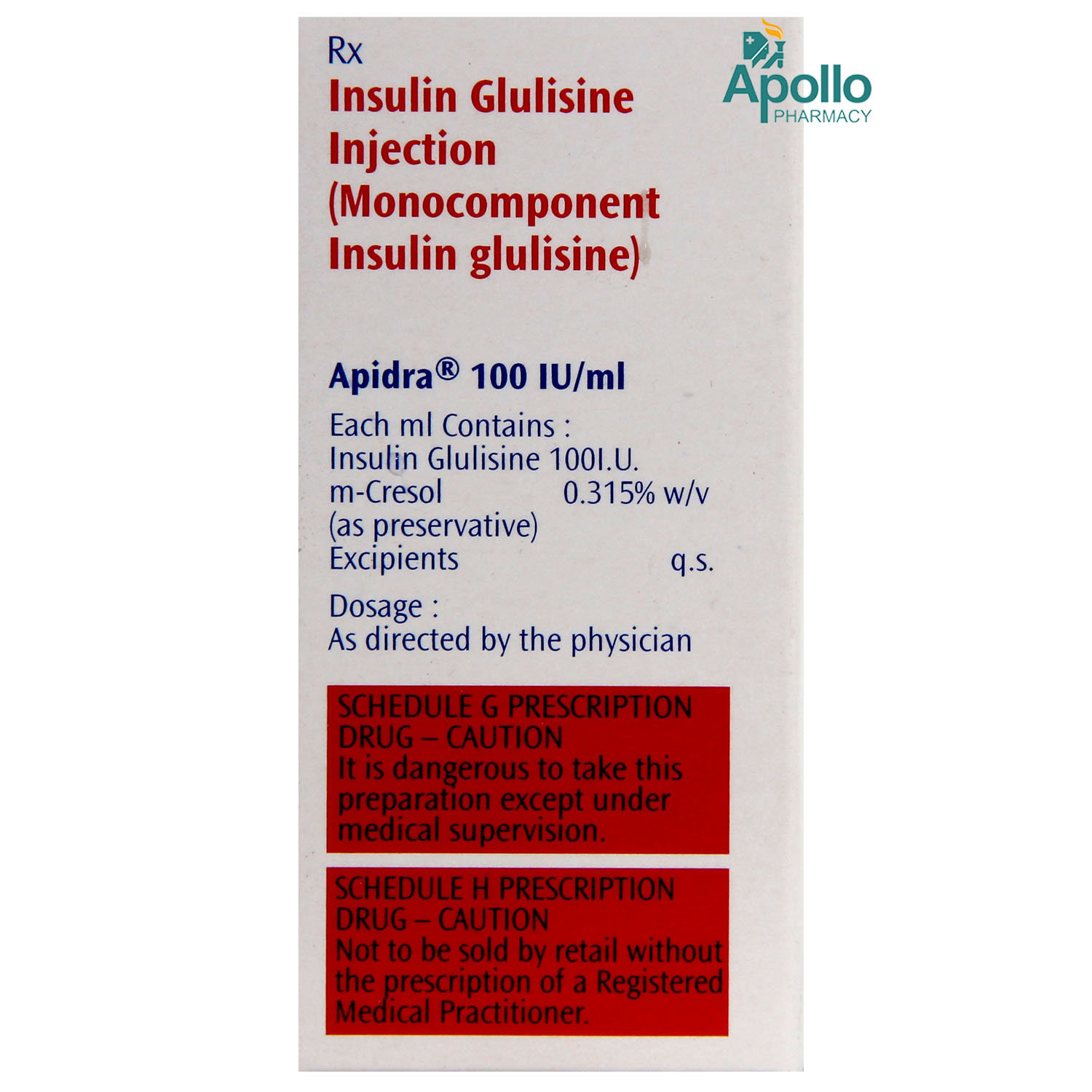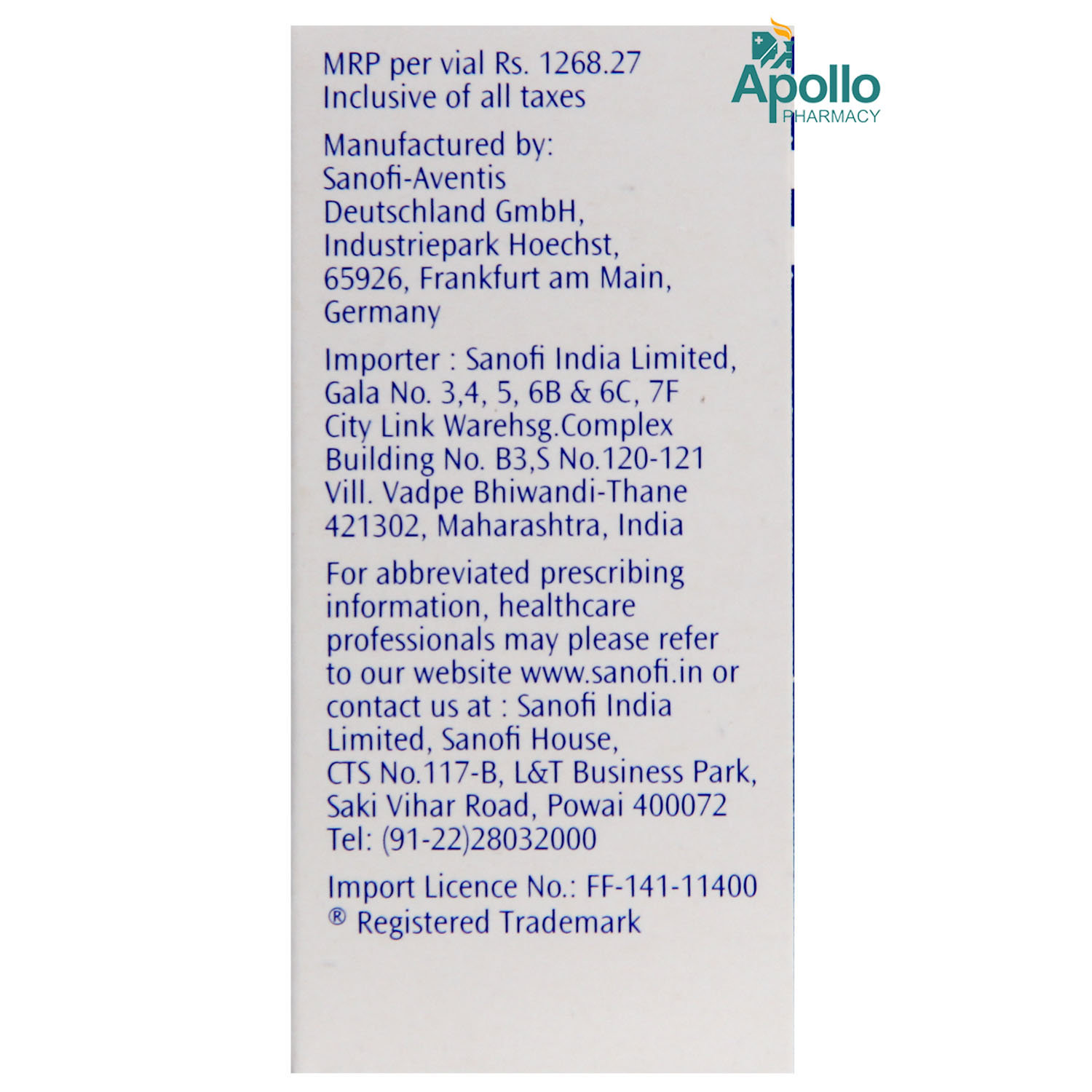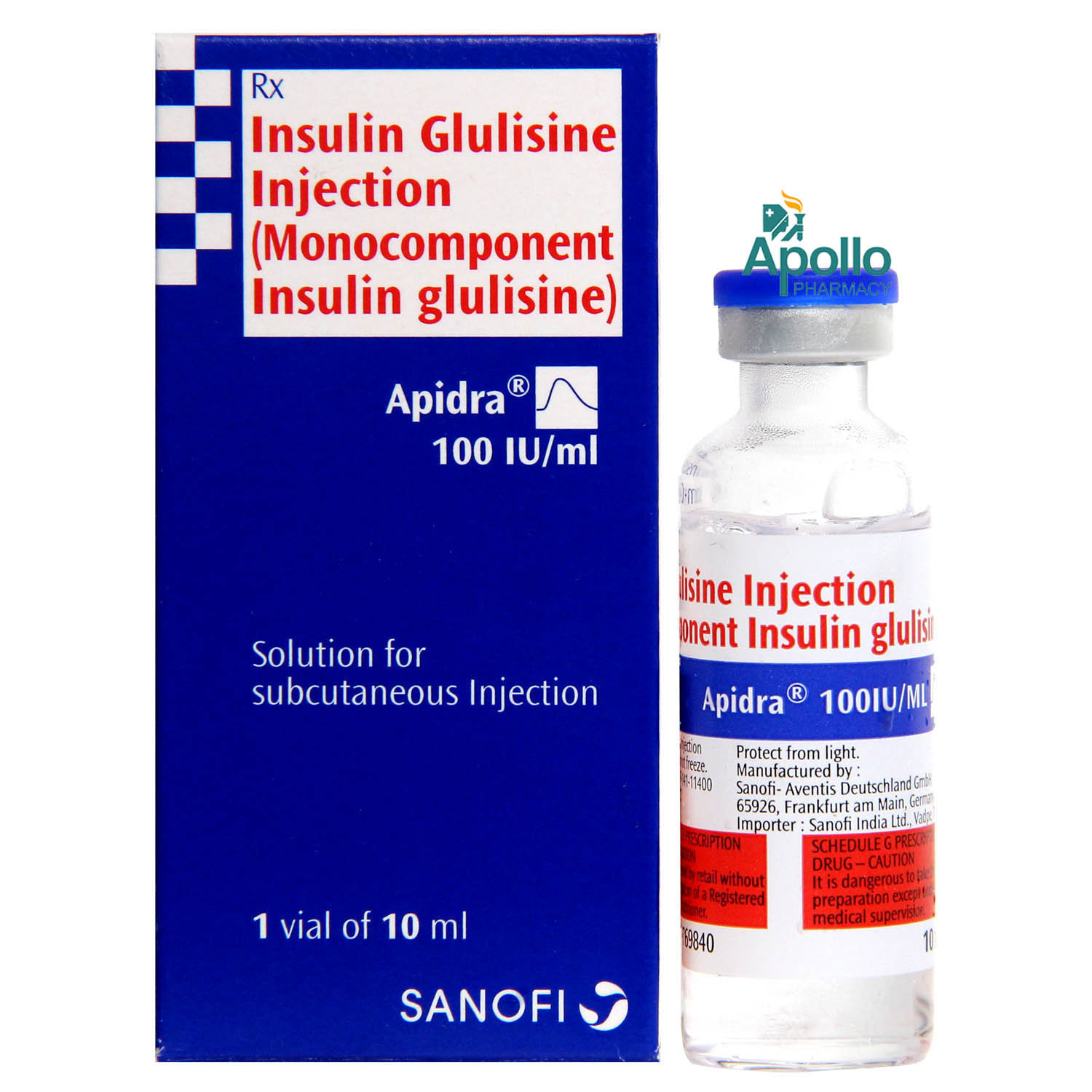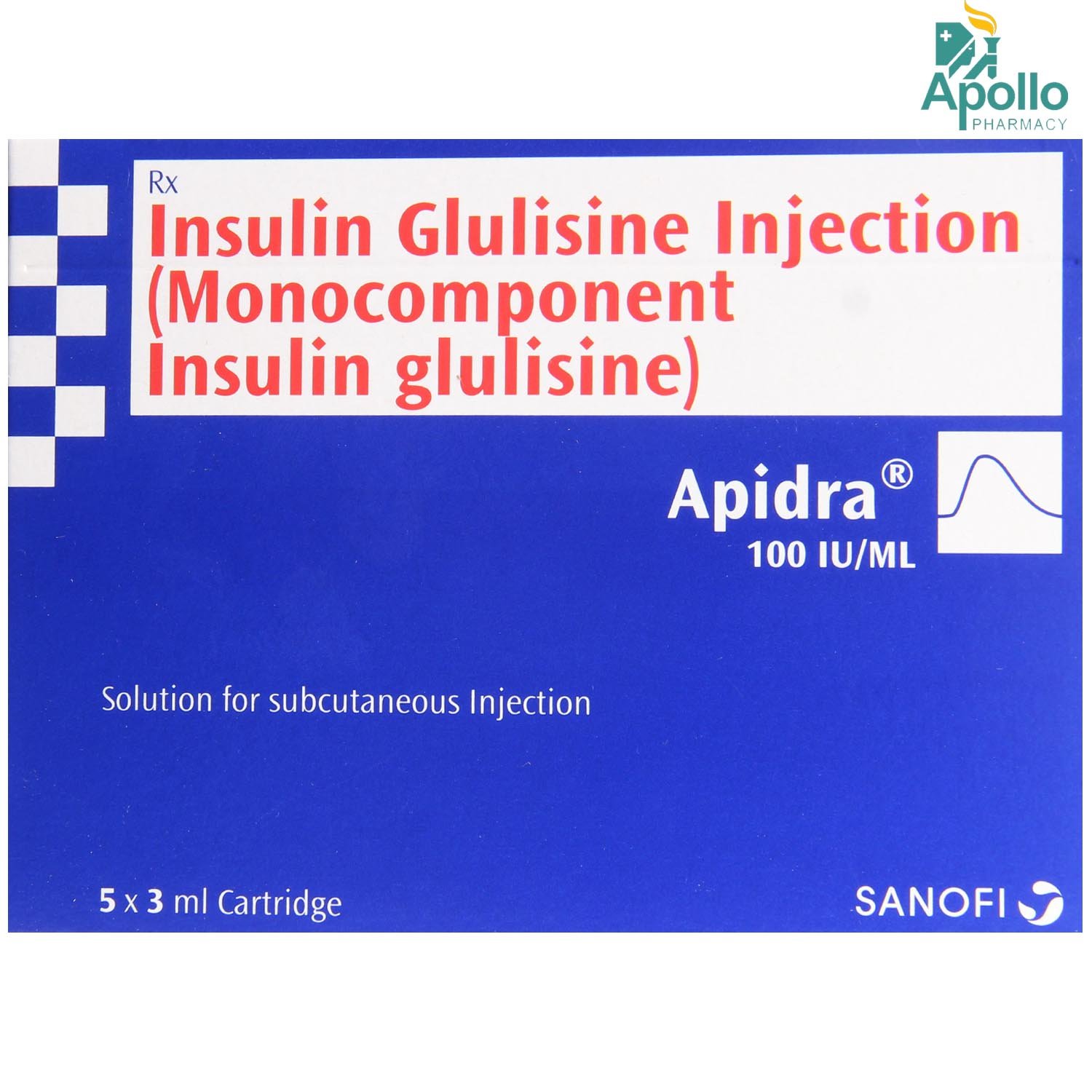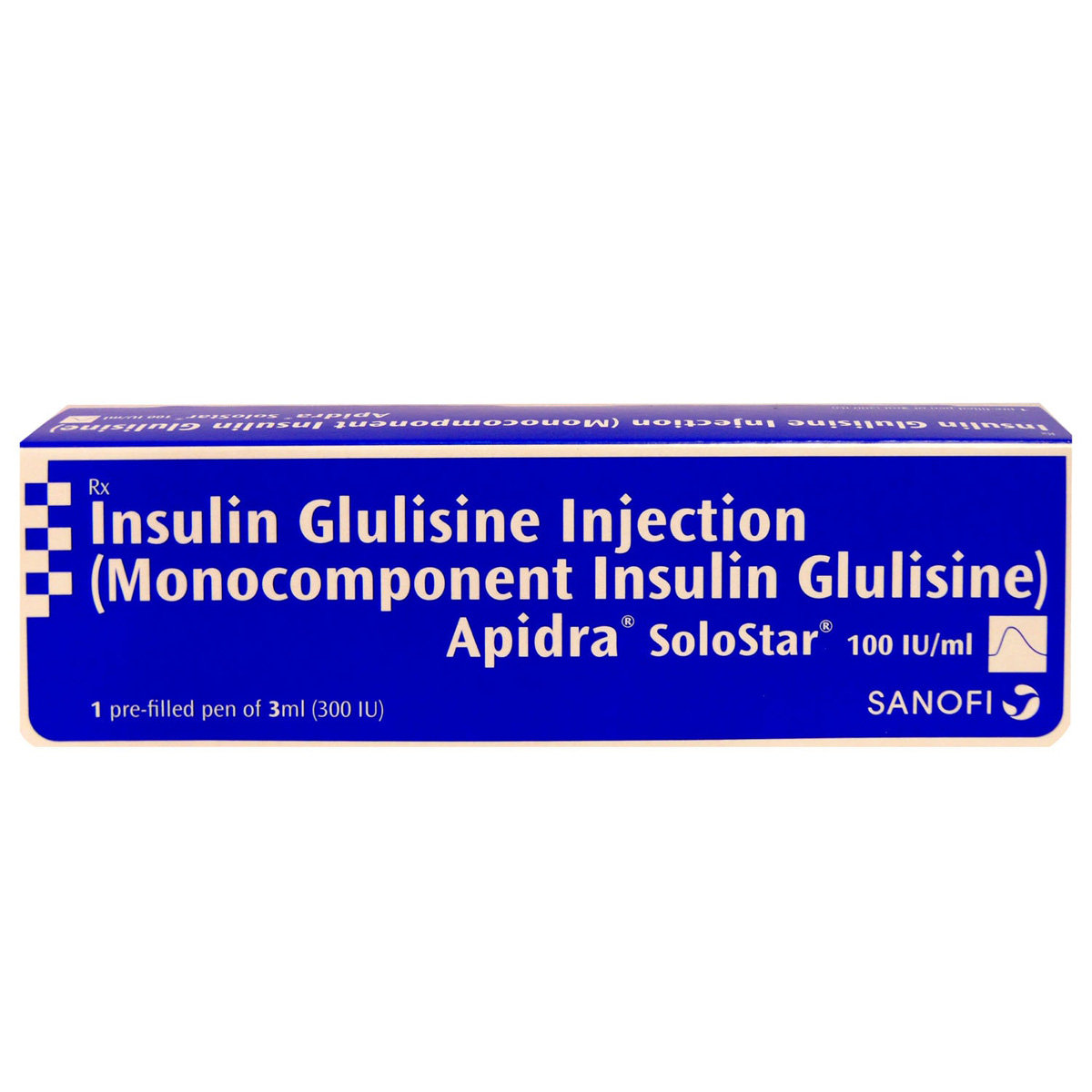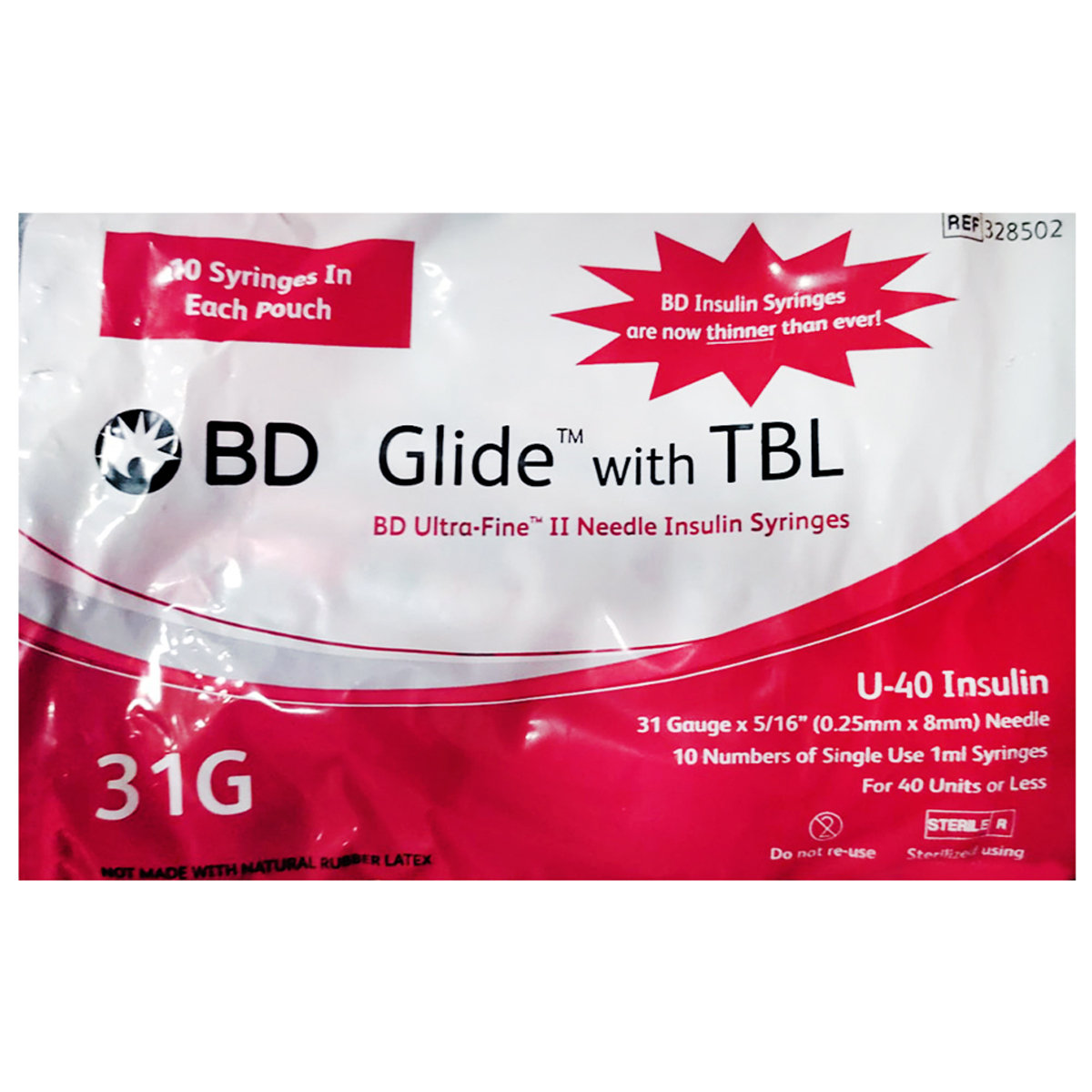Apidra 100IU / ml Injection 10 ml
MRP ₹1687
(Inclusive of all Taxes)
₹253.1 Cashback (15%)
Provide Delivery Location

secured payment

india's most trusted pharmacy

genuine products
Composition :
Manufacturer/Marketer :
Consume Type :
Expires on or after :
Return Policy :
About Apidra 100IU /ml Injection
Apidra 100IU /ml Injection is rapid-acting insulin for the treatment of diabetes mellitus in both children (above six years of age) and adults. The active ingredient in Apidra 100IU /ml Injection is insulin glulisine. Apidra 100IU /ml Injection is a recombinant human insulin analogue that is equipotent to regular human insulin. Insulin glulisine has a more rapid onset of action and a shorter duration of action than regular human insulin. Diabetes is a lifelong condition that causes a person's blood sugar level to become too high.
Apidra 100IU /ml Injection is a fast-acting insulin that works rapidly to normalise blood sugar levels after a meal. It typically begins working within 10-20 minutes after injection, peaks in about 1 hour, and keeps working for 2 to 4 hours. Due to this short action, Apidra 100IU /ml Injection should normally be taken in combination with intermediate-acting or long-acting insulin preparations. Apidra 100IU /ml Injection works by ensuring rapid and consistent sugar control. Apidra 100IU /ml Injection is a fast-acting form of insulin that helps lower blood sugar levels after food intake. Prevents the risk of having severe complications of diabetes.
The primary role of insulin and insulin analogues, including insulin glulisine, is glucose metabolism control. Insulin lowers blood glucose levels by stimulating peripheral glucose uptake, particularly skeletal muscle and fat, and inhibiting hepatic glucose production. Insulin glulisine takes effect about twice as fast as regular human insulin and completes the glucose-lowering effect about 2 hours earlier than regular human insulin.
Your doctor will advise you on how to use Apidra 100IU /ml Injection. It should be administered at least 0-15 minutes before or soon after meals. The common side effects of Apidra 100IU /ml Injection are hypokalaemia (low potassium), hypoglycaemia (low blood sugar level), local injection site reactions, lipodystrophy (fat deposition under the skin), rash, and pruritus (itch skin), which may occur at the injection site. Most of these side effects of Apidra 100IU /ml Injection do not require medical attention and gradually resolve over time. However, if the side effects are persistent, reach out to your doctor.
Try not to stop taking Apidra 100IU /ml Injection of your own. Let your doctor know about this, as it may cause withdrawal symptoms. Do not take Apidra 100IU /ml Injection if you have any low blood glucose levels, kidney, liver, or heart problems, or problems with alcohol or other prescription recreational drugs. Along with Apidra 100IU /ml Injection, you should take a healthy diet, exercise regularly, and maintain weight as your doctor advises. Apidra 100IU /ml Injection is a cold chain medicine, so it must be stored in the refrigerator between 2-8 degrees Celsius; otherwise, its efficiency might get lost. Do not store it in the freezer of the fridge.
Uses of Apidra 100IU /ml Injection

Have a query?
Directions for Use
Key Benefits
The primary role of insulin and insulin analogues, including insulin glulisine, is glucose metabolism control. Insulin lowers blood glucose levels by stimulating peripheral glucose uptake, particularly skeletal muscle and fat, and inhibiting hepatic glucose production. Apidra 100IU /ml Injection works by ensuring rapid and consistent sugar control. Apidra 100IU /ml Injection is a fast-acting form of insulin that helps lower blood sugar levels after food intake. Prevents the risk of having severe complications of diabetes. It stimulates the recovery of sugar in muscle and fat cells and thus suppresses sugar production in the liver. Apidra 100IU /ml Injection helps in improving the glycaemic control, which in turn decreases the risk of progression of complications of diabetes like damage of the retina (retinopathy), damage of kidney (nephropathy), damage of nerve cells (neuropathy), delayed wound healing, diabetic foot ulcer and others. Besides this, Apidra 100IU /ml Injection can be safely prescribed to the diabetic mother during pregnancy and lactation.
Storage
- Inform your doctor about the common cold symptoms you're experiencing due to medication.
- Your doctor may adjust your treatment plan, which could include changing your medication, adding new medications, or offering advice on managing your symptoms.
- Practice good hygiene, including frequent handwashing, avoiding close contact with others, and avoiding sharing utensils or personal items.
- Drink plenty of fluids, such as warm water or soup, to help thin out mucus.
- Get plenty of rest and engage in stress-reducing activities to help your body recover. If your symptoms don't subside or worsen, consult your doctor for further guidance.
- Inform your doctor about the symptoms you're experiencing due to medication.
- Your doctor may adjust your treatment plan, which could include changing your medication, adding new medications, or offering advice on managing your symptoms.
- Practice good hygiene, including frequent handwashing, avoiding close contact with others, and avoiding sharing utensils or personal items.
- Stay hydrated by drinking plenty of fluids to help loosen and clear mucus from your nose, throat, and airways.
- Get plenty of rest and engage in stress-reducing activities to help your body recover. If your symptoms don't subside or worsen, consult your doctor for further guidance.
- If you experience low blood sugar levels, inform your doctor. They will assess the severity and make recommendations for the next actions.
- Your doctor will assess your symptoms, blood sugar levels, and overall health before recommending the best course of action, which may include treatment, lifestyle modifications, or prescription adjustments.
- Follow your doctor's instructions carefully to manage the episode and adjust your treatment plan.
- Make medication adjustments as recommended by your doctor to prevent future episodes.
- Implement diet and lifestyle modifications as your doctor advises to manage low blood sugar levels.
- Monitor your blood sugar levels closely for patterns and changes.
- Track your progress by recording your blood sugar levels, food intake, and physical activity.
- Seek further guidance from your doctor if symptoms persist or worsen so that your treatment plan can be revised.
- Please inform your doctor about joint pain symptoms, as they may adjust your medication regimen or prescribe additional medications to manage symptoms.
- Your doctor may prescribe common pain relievers if necessary to treat joint discomfort.
- Maintaining a healthy lifestyle is key to relieving joint discomfort. Regular exercise, such as low-impact sports like walking, cycling, or swimming, should be combined with a well-balanced diet. Aim for 7-8 hours of sleep per night to assist your body in repairing and rebuilding tissue.
- Applying heat or cold packs to the affected joint can help reduce pain and inflammation.
- Please track when joint pain occurs and any factors that may trigger it, and share this information with your doctor to help manage symptoms.
- If your joint pain is severe or prolonged, consult a doctor to rule out any underlying disorders that may require treatment.
- Rest well; get enough sleep. This helps the body fight infection.
- Keep yourself hydrated by drinking enough water and other fluids.
- Wash your hands often and avoid touching your eyes, mouth or nose.
- Wear a mask whilst going out.
- Warm steam or a hot shower may help with nose secretions.
- Avoid contact with others to prevent contamination.
- Hydrate your body: Drink enough water to prevent dehydration and headaches.
- Calm Your Mind: Deep breathing and meditation can help you relax and relieve stress.
- Rest and Recharge: Sleep for 7-8 hours to reduce headache triggers.
- Take rest: lie down in a quiet, dark environment.
- Cold or warm compresses can help reduce tension.
- Stay Upright: Maintain good posture to keep symptoms from getting worse.
- To treat headaches naturally, try acupuncture or massage therapy.
- Over-the-counter pain relievers include acetaminophen and ibuprofen.
- Prescription Assistance: Speak with your doctor about more substantial drug alternatives.
- Severe Headaches: Seek emergency medical assistance for sudden, severe headaches.
- Frequent Headaches: If you get reoccurring headaches, consult your doctor.
- Headaches with Symptoms: Seek medical attention if your headaches include fever, disorientation, or weakness.
- Inform Your Doctor: Notify your doctor immediately about your diarrhoea symptoms. This allows them to adjust your medication or provide guidance on managing side effects.
- Stay Hydrated: Drink plenty of fluids to replace lost water and electrolytes. Choose water, clear broth, and electrolyte-rich drinks. Avoid carbonated or caffeinated beverages to effectively rehydrate your body.
- Follow a Bland Diet: Eat easy-to-digest foods to help firm up your stool and settle your stomach. Try incorporating bananas, rice, applesauce, toast, plain crackers, and boiled vegetables into your diet.
- Avoid Trigger Foods: Steer clear of foods that can worsen diarrhoea, such as spicy, fatty, or greasy foods, high-fibre foods, and dairy products (especially if you're lactose intolerant).
- Practice Good Hygiene: Maintain good hygiene to prevent the spread of infection. To stay healthy, wash your hands frequently, clean and disinfect surfaces regularly, and avoid exchanging personal belongings with others.
- Take Anti-Diarrheal Medications: If your doctor advises, anti-diarrheal medications such as loperamide might help manage diarrhoea symptoms. Always follow your doctor's directions.
- Keep track of your diarrhoea symptoms. If they don't get better or worse or are accompanied by severe stomach pain, blood, or dehydration signs (like extreme thirst or dark urine), seek medical help.
Drug Warnings
Apidra 100IU /ml Injection is for subcutaneous (under the skin) in the abdominal wall, thigh, or upper arm. It can also be administered intravenously (IV) only with 0.9% saline solution infusion. If you are changing the brand of insulin or if you need to inject your insulin by another method, it should be done under strict medical supervision. Cases of heart failure were reported when pioglitazone was used with insulin, especially in patients at high risk of cardiac heart failure. The first symptoms of hyperglycaemia (high blood sugar level) may include symptoms like excessive thirst, dry mouth, increased frequency of urination, nausea, vomiting, drowsiness, flushed dry skin, loss of appetite and acetone odour of the breath. You should closely monitor these symptoms. If you have had any heart attack or have weight gain and oedema (fluid deposition in tissue), let your doctor know before taking Apidra 100IU /ml Injection. It is advisable not to consume alcohol as it may either increase or decrease your blood glucose level. Care should be taken while travelling across more than two time zones. Your doctor may adjust your insulin schedule. Apidra 100IU /ml Injection may decrease the level of potassium (hypokalemia) if left untreated, may lead to respiratory paralysis, irregular heartbeat rhythm, coma and even death. Do not take Apidra 100IU /ml Injection if you have any low blood glucose levels, kidney, liver, or heart problems, or problems with alcohol or other prescription recreational drugs.
Drug-Drug Interactions
Drug-Drug Interactions
Login/Sign Up
Taking Apidra 100IU / ml Injection 10 ml with gatifloxacin affects blood glucose levels, which may cause hyperglycemia (high blood sugar) and hypoglycemia (low blood sugar) less frequently.
How to manage the interaction:
Although taking Gatifloxacin and Apidra 100IU / ml Injection 10 ml together can possibly result in an interaction, it can be taken if your doctor has prescribed it. However, consult the doctor immediately if you experience hypoglycemia or hyperglycemia. Symptoms of hypoglycemia include headache, dizziness, drowsiness, nervousness, confusion, shaking, nausea, loss of hunger, weakness, sweating, palpitation, and rapid heartbeat. Symptoms of hyperglycemia may include increased thirst, increased hunger, and increased urination. Do not stop using any medications without first talking to your doctor.
Taking Apidra 100IU / ml Injection 10 ml with sparfloxacin affects blood glucose levels, which may cause hyperglycemia (high blood sugar) and hypoglycemia (low blood sugar) less frequently.
How to manage the interaction:
Although taking Sparfloxacin and Apidra 100IU / ml Injection 10 ml together can possibly result in an interaction, it can be taken if your doctor has prescribed it. However, consult the doctor immediately if you experience hypoglycemia or hyperglycemia. Symptoms of hypoglycemia include headache, dizziness, drowsiness, nervousness, confusion, shaking, nausea, loss of hunger, weakness, sweating, palpitations, and rapid heartbeat. Symptoms of hyperglycemia may include increased thirst, increased hunger, and increased urination. Do not stop using any medications without first talking to your doctor.
Taking Apidra 100IU / ml Injection 10 ml with trovafloxacin affects blood glucose levels, which may cause hyperglycemia (high blood sugar) and hypoglycemia (low blood sugar) less frequently.
How to manage the interaction:
Although taking Trovafloxacin and Apidra 100IU / ml Injection 10 ml together can possibly result in an interaction, it can be taken if your doctor has prescribed it. However, consult the doctor immediately if you experience hypoglycemia or hyperglycemia. Symptoms of hypoglycemia include headache, dizziness, drowsiness, nervousness, confusion, shaking, nausea, loss of hunger, weakness, sweating, palpitations, and rapid heartbeat. Symptoms of hyperglycemia may include increased thirst, increased hunger, and increased urination. Do not stop using any medications without first talking to your doctor.
Taking ciprofloxacin with Apidra 100IU / ml Injection 10 ml can effect blood sugar levels, both hyperglycemia (high blood sugar) and, less frequently, hypoglycemia (low blood sugar).
How to manage the interaction:
Although taking Ciprofloxacin and Apidra 100IU / ml Injection 10 ml together can possibly result in an interaction, it can be taken if your doctor has prescribed it. However, consult the doctor immediately if you experience hypoglycemia or hyperglycemia. Symptoms of hypoglycemia include headache, dizziness, drowsiness, nervousness, confusion, shaking, nausea, loss of hunger, weakness, sweating, palpitations, and rapid heartbeat. Symptoms of hyperglycemia may include increased thirst, increased hunger, and increased urination. Do not stop using any medications without talking to a doctor.
Taking Apidra 100IU / ml Injection 10 ml with norfloxacin affects blood glucose levels, which may cause hyperglycemia (high blood sugar) and hypoglycemia (low blood sugar) less frequently.
How to manage the interaction:
Although taking Norfloxacin and Apidra 100IU / ml Injection 10 ml together can possibly result in an interaction, it can be taken if your doctor has prescribed it. However, consult the doctor immediately if you experience hypoglycemia or hyperglycemia. Symptoms of hypoglycemia include headache, dizziness, drowsiness, nervousness, confusion, shaking, nausea, loss of hunger, weakness, sweating, palpitations, and rapid heartbeat. Symptoms of hyperglycemia may include increased thirst, increased hunger, and increased urination. Do not stop using any medications without first talking to your doctor.
Taking Apidra 100IU / ml Injection 10 ml with lomefloxacin affects blood glucose levels, which may cause hyperglycemia (high blood sugar) and hypoglycemia (low blood sugar) less frequently.
How to manage the interaction:
Although taking Lomefloxacin and Apidra 100IU / ml Injection 10 ml together can possibly result in an interaction, it can be taken if your doctor has prescribed it. However, consult the doctor immediately if you experience hypoglycemia or hyperglycemia. Symptoms of hypoglycemia include headache, dizziness, drowsiness, nervousness, confusion, shaking, nausea, loss of hunger, weakness, sweating, palpitations, and rapid heartbeat. Symptoms of hyperglycemia may include increased thirst, increased hunger, and increased urination. Do not stop using any medications without first talking to your doctor.
Taking Apidra 100IU / ml Injection 10 ml with nalidixic acid affects blood glucose levels, which may cause hyperglycemia (high blood sugar) and hypoglycemia (low blood sugar) less frequently.
How to manage the interaction:
Although taking Nalidixic acid and Apidra 100IU / ml Injection 10 ml together can possibly result in an interaction, it can be taken if your doctor has prescribed it. However, consult the doctor immediately if you experience hypoglycemia or hyperglycemia. Symptoms of hypoglycemia include headache, dizziness, drowsiness, nervousness, confusion, shaking, nausea, loss of hunger, weakness, sweating, palpitations, and rapid heartbeat. Symptoms of hyperglycemia may include increased thirst, increased hunger, and increased urination. Do not stop using any medications without first talking to your doctor.
Blood glucose levels can be affected by levofloxacin when taken with Apidra 100IU / ml Injection 10 ml. They may cause hyperglycemia (high blood glucose) and, less commonly, hypoglycemia (low blood glucose).
How to manage the interaction:
Although taking Levofloxacin and Apidra 100IU / ml Injection 10 ml together can result in an interaction, it can be taken if a doctor has prescribed it. However, consult the doctor immediately if you experience hypoglycemia or hyperglycemia. Symptoms of hypoglycemia include headache, dizziness, drowsiness, nervousness, confusion, shaking, nausea, loss of hunger, weakness, sweating, palpitations, and rapid heartbeat. Symptoms of hyperglycemia may include increased thirst, increased hunger, and increased urination. Do not stop using any medications without talking to a doctor.
Taking Apidra 100IU / ml Injection 10 ml with enoxacin affects blood glucose levels, which may cause hyperglycemia (high blood sugar) and hypoglycemia (low blood sugar) less frequently.
How to manage the interaction:
Although taking Enoxacin and Apidra 100IU / ml Injection 10 ml together can possibly result in an interaction, it can be taken if your doctor has prescribed it. However, consult the doctor immediately if you experience hypoglycemia or hyperglycemia. Symptoms of hypoglycemia include headache, dizziness, drowsiness, nervousness, confusion, shaking, nausea, loss of hunger, weakness, sweating, palpitations, and rapid heartbeat. Symptoms of hyperglycemia may include increased thirst, increased hunger, and increased urination. Do not stop using any medications without first talking to your doctor.
Taking Apidra 100IU / ml Injection 10 ml with moxifloxacin affects blood glucose levels, which may cause hyperglycemia (high blood sugar) and hypoglycemia (low blood sugar) less frequently.
How to manage the interaction:
Although taking Moxifloxacin and Apidra 100IU / ml Injection 10 ml together can result in an interaction, it can be taken if a doctor has prescribed it. However, consult the doctor immediately if you experience headache, dizziness, and rapid heartbeat, increased thirst, and increased urination. Do not stop using any medications without talking to a doctor.
Drug-Food Interactions
Drug-Food Interactions
Login/Sign Up
Diet & Lifestyle Advise
- Exercise may lower your body’s need for insulin during and sometimes after physical activity.
- Exercise may also speed up the effect of an insulin dose, especially if the exercise involves the area of the injection site (for example, the leg should not be used for injection just prior to running).
- Discuss with your doctor how to adjust your insulin regimen to accommodate exercise.
- Avoid eating sugar food and prefer food cooked food low in calories.
- When travelling across more than two time zones, you should talk to your doctor concerning adjustments in your insulin schedule.
Habit Forming
Therapeutic Class
All Substitutes & Brand Comparisons
RX
Apidra 100IU Cartridge 3 ml
Sanofi India Ltd
₹837
(₹279.0/ 1ml)
65% COSTLIERRX
Apidra Solostar 100IU/ml Injection 3 ml
Sanofi India Ltd
₹1064
(₹354.67/ 1ml)
110% COSTLIER
Alcohol
Safe if prescribed
You are recommended not to consume alcohol along with Apidra 100IU /ml Injection to avoid unpleasant side-effects. Alcohol may either decrease or increase the blood sugar level which can be fatal.
Pregnancy
Consult your doctor
Apidra 100IU /ml Injection can be used during pregnancy. Your insulin dose may need to be changed during pregnancy and after delivery.
Breast Feeding
Consult your doctor
Apidra 100IU /ml Injection can be given safely to nursing mothers but only under the supervision of a physician.
Driving
Safe if prescribed
Drive with caution, Apidra 100IU /ml Injection usually causes drowsiness and affects driving ability. Your ability to concentrate and react may be reduced if you have hypoglycaemia (low blood sugar).
Liver
Consult your doctor
Apidra 100IU /ml Injection to be taken with caution, especially if you have a history of liver diseases/conditions. The dose may have to be adjusted by your doctor.
Kidney
Consult your doctor
Apidra 100IU /ml Injection to be taken with caution, especially if you have a history of kidney diseases/conditions. The dose may have to be adjusted by your doctor.
Children
Safe if prescribed
Apidra 100IU /ml Injection can be given safely to children provided; dose has to be prescribed by a child specialist.
FAQs
Apidra 100IU /ml Injection can be given to treat both the condition of type 1 and type 2 diabetes mellitus. However, your doctor will decide whether Apidra 100IU /ml Injection can be given to you or not depending on your present condition. Apidra 100IU /ml Injection should be avoided in patients who are allergic to Apidra 100IU /ml Injection or other forms of insulin, patients with kidney disease, liver disease, low blood sugar/glucose level (hypoglycaemia), and low potassium level (hypokalaemia).
Insulin kept out of the refrigerator will not poison you or even make you sick. It just means that your insulin will not work as well or deliver its full potential dose. In simple terms, if your blood sugar is high, and you use the insulin that has been kept out, your blood sugar may not be lowered.
Insulin is released from the beta cells in your pancreas in response to the rise in glucose in your bloodstream. After you have consumed a meal, any carbohydrate you have eaten is broken down into glucose and transferred into the bloodstream. The pancreas detects this rise in blood glucose and starts to secrete insulin.
Habitual moderate coffee drinking has actually been associated with increased insulin sensitivity and lowered risk for type 2 diabetes. But in acute and high doses, caffeine can decrease insulin sensitivity and raise plasma insulin levels.
Insulin is released from the beta cells present in your pancreas in response to rising glucose in your bloodstream. The pancreas detects this rise in blood glucose and starts to secrete insulin.
A hard-boiled egg is a handy high-protein snack when you have diabetes. Your protein will help keep you full without impacting your blood sugar. Protein not only slows down digestion, but it also slows down the absorption of glucose. If you have diabetes, this is very beneficial.
Pramlintide, Ethanol (Alcohol) and Macimorelin have got serious interactions with Apidra 100IU /ml Injection. So, do not take these medicines with Apidra 100IU /ml Injection.
Country of origin
Manufacturer/Marketer address
Disclaimer
Keep Refrigerated. Do not freeze.Prepaid payment required.
Author Details
We provide you with authentic, trustworthy and relevant information


